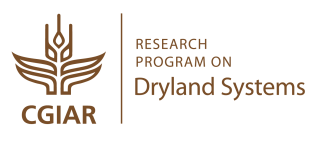Workshop Interviews: Integrated Crop-Livestock Production for Marginal and Favourable Ecosystems
Published on: November 8, 2016, Submitted by José José Posligua Molina on: November 1, 2016
Scientists from North Africa and West Asia received training on integrated crop-livestock productivity solutions.
Dr. M. Iqbal Anjum, Dr. Faisal GH. Juma Al-Fadhli, Dr. Iyad Abdel Abou Badran, Dr. Khafan Matar Naser Al Shargi at "Integrated Crop-Livestock Production for Marginal and Favourable Ecosystems" workshop, Amman 18-29 September 2016.
The workshop "Integrated Crop-Livestock Production for Marginal and Favourable Ecosystems" has been held by the International Center for Agricultural Research in Dry Areas (ICARDA) in Amman, from 18th to 29th September 2016, to provide common ground for scientists to interact, share knowledge and develop new solutions for integrated crop-livestock agricultural systems. In compliance with the rule of transparency and for internal audit, ICARDA has asked the trainees to evaluate the workshop and related activities. The scientists have commented the main seminar received and specific activities individually throught Monitoring, Evaluation & Learning (MEL), the M&E platform open to any ICARDA member and related partners. The scientists without suitable laptops or smartphones have been provided with tablets to carry on the survey.
The Capacity Development (CapDev) assessment has been directed by the Summer-GIS Interns at the ICARDA Geo-informatics Unit (GU) and the Program Management Unit (PMU) of the CGIAR Research program on Dryland Systems (CRP-DS), promptly demonstrating to the participants on how to login MEL and carry out the evaluation through the dedicated module. By following the trainess individually, the interns ensured that the information was well-received and replicable in all their respective organisations worldwide. Thanks to this and any other assessment, ICARDA is able to improve the quality of its workshops and activities for better capacity development, coordination and scientific information.
In addition to the formal evaluation, we have collected some impressions from the participating scientists and their perspective about the workshop and the assessment initiative:
Could you please introduce yourself and explain why did you choose this training program?
My name is Dr. Iyad Abdel Abou Badran and I work in an international agricultural research center in Palestine. This program will help our respective countries in finding better solutions for managing different livestock sectors.- Dr. Iyad Abdel Abou Badran, Palestine.
Have you received suitable answers to one or more of your concerns about your research field during the training?
Yes, especially about breeding and the importance of milk production for nutrition. I will use this knowledge, replicate it in my country and try to introduce the new technologies, especially in breeding. I am also going to advise my fellow researchers to participate in future courses like this.- Dr. M. Iqbal Anjum, Pakistan.
This training hosts participants worldwide. To what degree this aspect contributes to the knowledge sharing?
It is enriching to meet colleagues from different countries and areas, such as North Africa. We can share best practices and the results achieved so far in each country. Another important benefit is the change in perspective: we all act on different climates and environmental conditions, arid, semi-arid or rangelands for examples, and the variety of breeds to consider of small ruminants like sheep and goats is wider too.
Did you participate in any other ICARDA training before? Has the quality improved?
Yes, I had one in 2013, it was in Aleppo, Syria, also on “Integrated Crop-Livestock Systems”. That one was more focused on marginal and favourable ecosystems, but during this one I acquired more direct knowledge and skills on crop-livestock integration, so it was nice to participate as well.- Dr. Faisal GH. Juma Al-Fadhli, Iraq.
The aim of the facilitation was to enable the transfer of theoretical and practical skills through direct interaction. Did you find this strategy successful? Do you have any recommendations so far?Yes, it is a very successful strategy. The organizer [ICARDA, Ed.] is also open to design projects and programs for better cooperation between the participants, to keep sharing knowledge together even after the workshop. I hope it will continue.
- Dr. Khafan Matar Naser Al Shargi, Oman.
The MEL Evaluation module is always available to any MEL user, for each of their activities and projects offering Partnership and CapDev engagement. Check out MEL Channel to know more about the platform and learn how to carry on the surveys.
Acknowledgement
The workshop "Integrated Crop-Livestock Production for Marginal and Favourable Ecosystems" has been conducted by The International Center for Agricultural Research in Dry Areas (ICARDA), in the framework of the CGIAR Research Program on Dryland Systems (CRP-DS).




